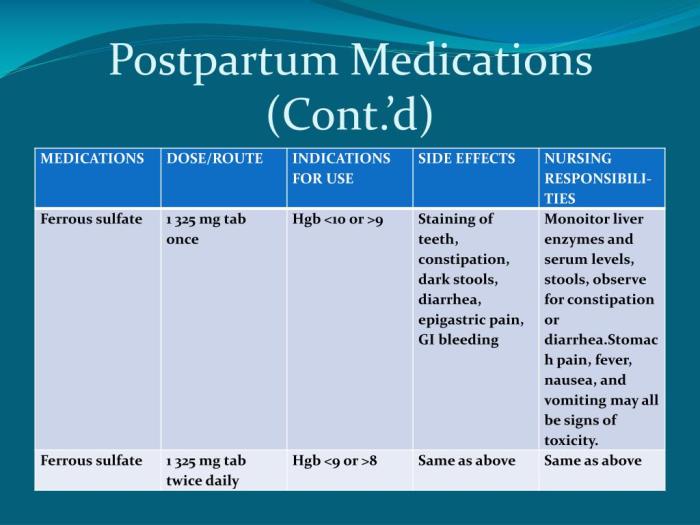Anticipating provider prescriptions for a postpartum client is a crucial aspect of ensuring optimal care during this vulnerable period. This comprehensive guide explores the significance of monitoring and anticipating prescriptions, potential complications, and strategies for effective management. It also highlights the importance of patient education, interdisciplinary collaboration, and ethical considerations to ensure safe and effective medication use.
Postpartum Care Management

Postpartum care management plays a pivotal role in ensuring the well-being of postpartum clients. Anticipating and monitoring provider prescriptions is crucial to prevent complications, optimize patient outcomes, and enhance patient safety.
Effective management of postpartum prescriptions requires a comprehensive approach, including:
- Monitoring and anticipating provider prescriptions:Healthcare providers must proactively anticipate and monitor all prescriptions, considering the potential for adverse effects and interactions.
- Identifying and prioritizing prescriptions:Prioritize prescriptions based on their urgency, potential risks, and impact on the patient’s overall health.
- Collaboration with other healthcare providers:Interdisciplinary collaboration is essential to ensure seamless and coordinated care, including medication management.
Medication Interactions and Safety

Prescribing medications during the postpartum period requires careful consideration of potential drug interactions. Healthcare providers must:
- Assess for potential drug interactions:Evaluate the patient’s medication history, including over-the-counter medications and supplements, to identify potential interactions.
- Minimize the risk of adverse drug reactions:Implement strategies to minimize the risk of adverse reactions, such as starting with low doses and monitoring the patient closely.
- Be aware of common postpartum medications:Familiarize themselves with common postpartum medications and their potential interactions, such as analgesics, antibiotics, and hormonal therapies.
Patient Education and Compliance
Patient education is paramount to ensure adherence to prescribed medications. Healthcare providers must:
- Provide clear instructions:Explain the purpose, dosage, frequency, and potential side effects of each medication.
- Answer patient questions:Address patient concerns and questions to promote understanding and compliance.
- Emphasize the importance of adherence:Highlight the importance of taking medications as prescribed to achieve optimal outcomes.
Monitoring and Follow-Up: Anticipating Provider Prescriptions For A Postpartum Client
Regular monitoring and follow-up are crucial to assess patient response to medications and adjust prescriptions as needed. Healthcare providers should:
- Establish a monitoring plan:Determine the frequency and type of follow-up appointments based on the patient’s individual needs and the medications prescribed.
- Monitor patient response:Evaluate the patient’s response to medications, including efficacy, side effects, and adherence.
- Document progress and adjust prescriptions:Document patient progress and make appropriate adjustments to prescriptions based on monitoring results.
Interdisciplinary Collaboration
Interdisciplinary collaboration among healthcare providers is essential for optimal postpartum medication management. The roles of different healthcare professionals include:
- Physicians:Prescribing medications and monitoring patient response.
- Nurses:Administering medications, educating patients, and monitoring for adverse effects.
- Pharmacists:Reviewing prescriptions, assessing for drug interactions, and providing medication counseling.
- Other healthcare professionals:Providing support and resources to patients, such as social workers, lactation consultants, and physical therapists.
Ethical Considerations
Ethical considerations are paramount when prescribing medications for postpartum clients. Healthcare providers must:
- Obtain informed consent:Ensure that patients fully understand the risks and benefits of medications before prescribing them.
- Respect patient autonomy:Respect the patient’s right to make informed decisions about their care, including the use of medications.
- Address ethical dilemmas:Be prepared to address ethical dilemmas that may arise, such as conflicts between patient preferences and medical recommendations.
FAQ Compilation
What are the potential complications if postpartum prescriptions are not managed effectively?
Ineffective prescription management can lead to adverse drug reactions, medication errors, delayed recovery, and compromised patient safety.
How can healthcare providers identify and prioritize prescriptions that require close attention?
Providers should consider factors such as potential drug interactions, the patient’s medical history, and the specific postpartum conditions being treated.
What is the role of patient education in ensuring adherence to prescribed medications?
Patient education empowers individuals to understand their medications, dosage instructions, and potential side effects, fostering adherence and reducing the risk of medication errors.